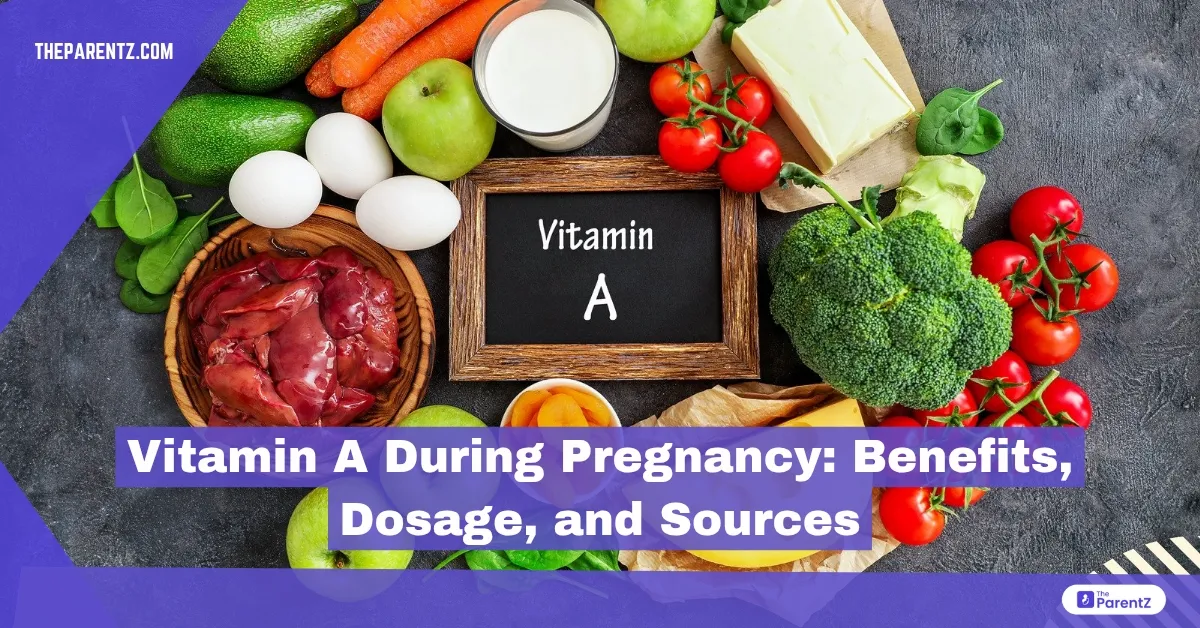Just like other nutrients, vitamin A too plays a big role during pregnancy, an essential phase for both mother and the developing baby. This fat-soluble is significant when it comes to a baby’s development, immune function, and vision.
However, too much or too little can lead to severe complications.
The real concern is—how much vitamin A do you really need during pregnancy? Find out the best sources, dosage, and other interesting facts in this article.
Recommended Dosage of Vitamin A During Pregnancy
Vitamin A is essential for fetal growth, organ development, and maternal health. Besides, it also plays a significant role in immune function and vision development.
In fact, according to the World Health Organization (WHO), vitamin A deficiency in pregnancy can lead to night blindness, poor immunity, and other complications during childbirth. However, excessive intake can cause birth defects.
The required amount of vitamin A may vary depending on the trimester and other health factors:
| Stage of Pregnancy | Recommended Daily Intake (mcg RAE)* | Upper Limit (mcg RAE) |
| First Trimester | 770 mcg | 3,000 mcg |
| Second Trimester | 770-800 mcg | 3,000 mcg |
| Third Trimester | 800 mcg | 3,000 mcg |
| Breastfeeding | 1,200-1,300 mcg | 3,000 mcg |
Exceeding 3,000 mcg (10,000 IU) per day can lead to birth defects which may impact the baby’s skull, eyes, and heart.
Benefits of Vitamin A During Pregnancy
From supporting baby’s growth to promoting red blood cells production, here are the key benefits of Vitamin A during pregnancy.
Supports Baby’s Growth and Development
Vitamin A is crucial for organ formation in the baby, especially the heart, lungs, kidneys, and eyes. Moreover, it also helps in proper cell differentiation, meaning all the organs develop correctly.
Boosts Immunity
A strong immunity is essential during pregnancy. Vitamin A actually helps fight infections while reducing the risk of maternal illnesses, and also supporting the baby’s developing immune system.
Maintains Maternal Eye Health
Did you know that night blindness is common in vitamin A-deficient women? Therefore, it is important to ensure adequate intake to prevent vision problems and dry eyes.
Promotes Healthy Skin
Yes, vitamin A also plays an essential role in skin health, helping it to prevent stretch marks, dryness, and infections. Besides, it also helps in postpartum tissue repair, so you can recover from childbirth faster.
Supports Red Blood Cell Production
Lastly, during pregnancy, your body needs to produce more blood to support both mother and baby. Vitamin A helps significantly in red blood cell formation, thereby reducing the risk of anemia.
Best Food Sources of Vitamin A
Some of the best vitamin A-rich foods include:
| Food Source | Vitamin A Content (mcg RAE per 100g) | Type |
| Beef Liver | 9,442 mcg | Retinol |
| Carrots | 835 mcg | Beta-Carotene |
| Sweet Potatoes | 709 mcg | Beta-Carotene |
| Spinach | 469 mcg | Beta-Carotene |
| Eggs | 140 mcg | Retinol |
| Milk | 68 mcg | Retinol |
| Mangoes | 54 mcg | Beta-Carotene |
Conclusion
Vitamin A is an essential nutrient during pregnancy. It plays a big role in supporting fetal growth, immunity, vision, and red blood cell production. However, it is important to hit that balance of neither too much nor too little. The best approach to meet your vitamin A needs is by incorporating natural food sources into your diet. If you still face any signs of vitamin A deficiency, consult your healthcare provider.








Be the first one to comment on this story.